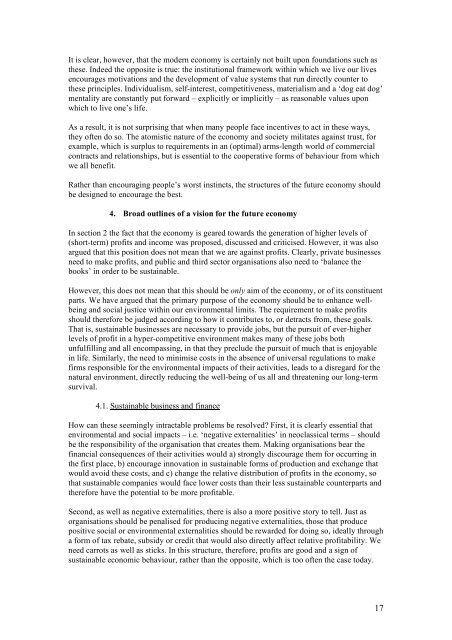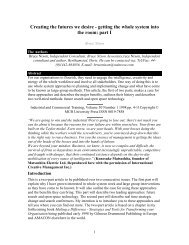From Old Economics to New Economics- Radical ... - Bruce Nixon
From Old Economics to New Economics- Radical ... - Bruce Nixon
From Old Economics to New Economics- Radical ... - Bruce Nixon
Create successful ePaper yourself
Turn your PDF publications into a flip-book with our unique Google optimized e-Paper software.
It is clear, however, that the modern economy is certainly not built upon foundations such as<br />
these. Indeed the opposite is true: the institutional framework within which we live our lives<br />
encourages motivations and the development of value systems that run directly counter <strong>to</strong><br />
these principles. Individualism, self-interest, competitiveness, materialism and a ‘dog eat dog’<br />
mentality are constantly put forward – explicitly or implicitly – as reasonable values upon<br />
which <strong>to</strong> live one’s life.<br />
As a result, it is not surprising that when many people face incentives <strong>to</strong> act in these ways,<br />
they often do so. The a<strong>to</strong>mistic nature of the economy and society militates against trust, for<br />
example, which is surplus <strong>to</strong> requirements in an (optimal) arms-length world of commercial<br />
contracts and relationships, but is essential <strong>to</strong> the cooperative forms of behaviour from which<br />
we all benefit.<br />
Rather than encouraging people’s worst instincts, the structures of the future economy should<br />
be designed <strong>to</strong> encourage the best.<br />
4. Broad outlines of a vision for the future economy<br />
In section 2 the fact that the economy is geared <strong>to</strong>wards the generation of higher levels of<br />
(short-term) profits and income was proposed, discussed and criticised. However, it was also<br />
argued that this position does not mean that we are against profits. Clearly, private businesses<br />
need <strong>to</strong> make profits, and public and third sec<strong>to</strong>r organisations also need <strong>to</strong> ‘balance the<br />
books’ in order <strong>to</strong> be sustainable.<br />
However, this does not mean that this should be only aim of the economy, or of its constituent<br />
parts. We have argued that the primary purpose of the economy should be <strong>to</strong> enhance wellbeing<br />
and social justice within our environmental limits. The requirement <strong>to</strong> make profits<br />
should therefore be judged according <strong>to</strong> how it contributes <strong>to</strong>, or detracts from, these goals.<br />
That is, sustainable businesses are necessary <strong>to</strong> provide jobs, but the pursuit of ever-higher<br />
levels of profit in a hyper-competitive environment makes many of these jobs both<br />
unfulfilling and all encompassing, in that they preclude the pursuit of much that is enjoyable<br />
in life. Similarly, the need <strong>to</strong> minimise costs in the absence of universal regulations <strong>to</strong> make<br />
firms responsible for the environmental impacts of their activities, leads <strong>to</strong> a disregard for the<br />
natural environment, directly reducing the well-being of us all and threatening our long-term<br />
survival.<br />
4.1. Sustainable business and finance<br />
How can these seemingly intractable problems be resolved First, it is clearly essential that<br />
environmental and social impacts – i.e. ‘negative externalities’ in neoclassical terms – should<br />
be the responsibility of the organisation that creates them. Making organisations bear the<br />
financial consequences of their activities would a) strongly discourage them for occurring in<br />
the first place, b) encourage innovation in sustainable forms of production and exchange that<br />
would avoid these costs, and c) change the relative distribution of profits in the economy, so<br />
that sustainable companies would face lower costs than their less sustainable counterparts and<br />
therefore have the potential <strong>to</strong> be more profitable.<br />
Second, as well as negative externalities, there is also a more positive s<strong>to</strong>ry <strong>to</strong> tell. Just as<br />
organisations should be penalised for producing negative externalities, those that produce<br />
positive social or environmental externalities should be rewarded for doing so, ideally through<br />
a form of tax rebate, subsidy or credit that would also directly affect relative profitability. We<br />
need carrots as well as sticks. In this structure, therefore, profits are good and a sign of<br />
sustainable economic behaviour, rather than the opposite, which is <strong>to</strong>o often the case <strong>to</strong>day.<br />
17



